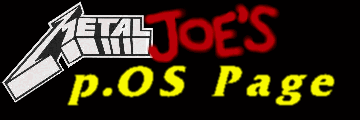

This page will no longer be supported...
Despite lack of information or support from ProDAD, I've been maintaining this page as regularly
as possible - keeping it updated with the many changes in the Amiga world, including any little
snippets of information about p.OS I may encounter, and adding a little commentary to liven things
up slightly. However, the work has become, to be honest, a waste of time and effort and I am now
ceasing all work regarding p.OS.
When I first heard of p.OS, at a time when the future of the Amiga looked possible, but still grim, it had such promise. It wasn't going to be a true replacement for AmigaOS, but its features offered a way to take Amigas, and even other platforms, further into the future. Not so much a revolution as an evolution, offering a sound basis for other developments. It didn't even have to replace your current operating system, and offered an API compatible with AmigaOS - a developer's dream.
However, it should have been obvious from the beginning that p.OS just wasn't going to make it. There are only two public releases of p.OS that I know of - the alpha, developer's release included with Geek Gadgets 2, and the public pre-release for 68020+ Amigas. I own the GG2 version, but have never been able to get it to work - the software insists it expired on the zeroth month of the year, whenever that is supposed to be! The GG2 development kit had the foundations of a good system, but that's all it had - foundations and no substance. Most of the material was either partially implemented or missing, and wasn't suitable for creating anything other than basic applications.
The pre-release was apparently just as flawed. It had to run in tandem with AmigaOS, lacked many tools and services, and wasn't well supported on the third-party software front. One reviewer compared it to a cut-down version of a workbench replacement, rather than an OS. In fact, other than the software bundled with Geek Gadgets 2 or the p.OS pre-release, I've never encountered any p.OS software - shareware, public domain or commercial. Certainly not a good situation for a new OS. There were no incentives to develop, other than the relative ease of porting applications (once the API was complete).
To make matters worse, ProDAD seem incapable of promoting or supporting p.OS. After the initial announcement, and a couple of news items from 1996, there was nothing at all advertised on their site, or elsewhere. In fact, their recent (apparently half-abandoned) site update has totally ignored p.OS altogether. The p.OS pages are still on the server, with broken images, but not linked from anywhere.
The last time I contacted ProDAD (February 1998) they were insistant that p.OS was progressing
well on Amiga and PC architectures - which I assume means 68020+, PowerPC and X86 systems. The World
of Amiga announcement was probably a serious blow to p.OS - after all, who wants a slightly enhanced
AmigaOS clone, when they can have a fully compatible, and highly advanced new version of AmigaOS?
However, there was a suitable 'niche' market ProDAD could have adopted - that of 'Classic' Amiga
users seeking the abandoned OS 3.5 update (which now looks set to be resurrected anyway). What of
ex-Amigans who had left for the PC or PowerMac? Surely some could have made use of p.OS as well?
ProDAD remained silent on the matter.
If ProDAD can't support their own product, I don't feel it's worthwhile supporting it either -
p.OS could have been abandoned for all I know! With AmigaOS 5 coming up, my attention (like most
Amiga users') has turned towards the next generation of Amigas. There are some exciting developments
forthcoming in the world of the Amiga, but I'm afraid to say p.OS is unlikely to ever become one of
them...